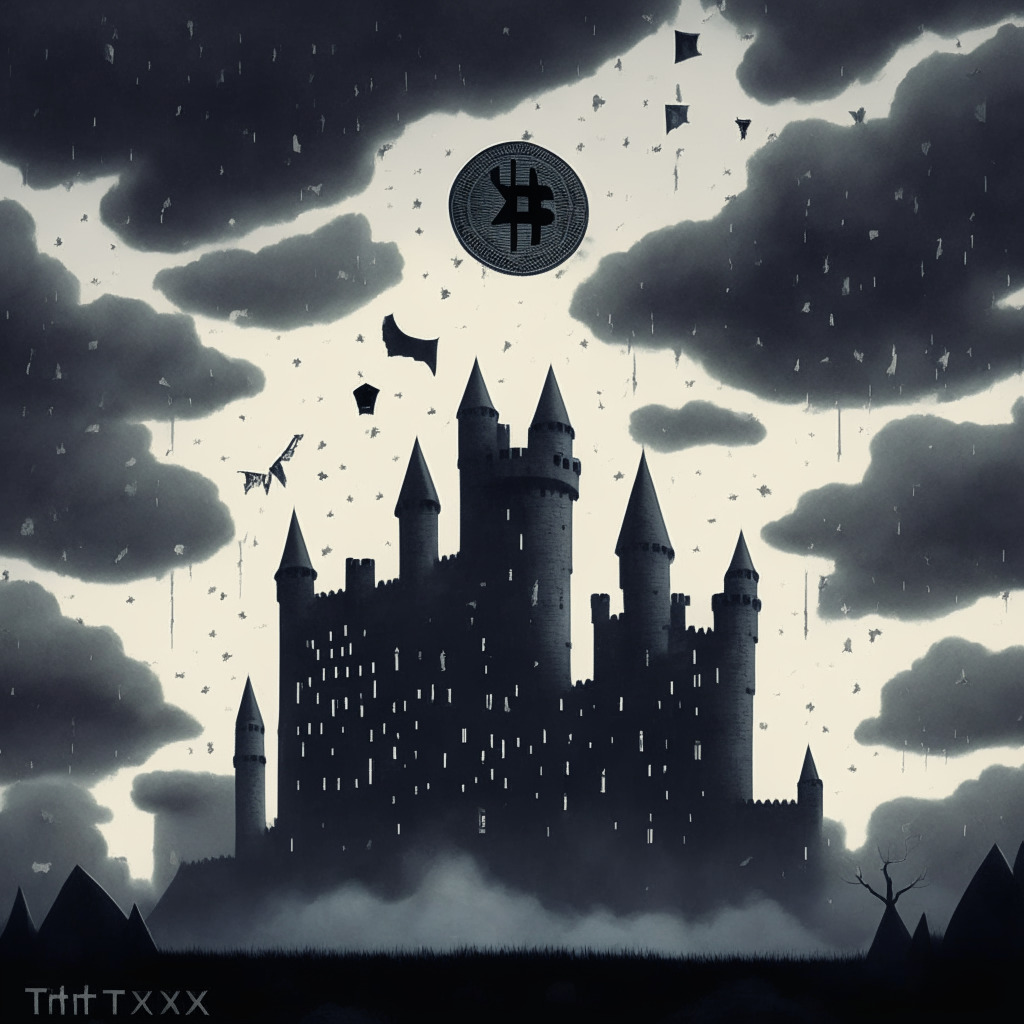“PayPal has plans to make Crypto.com the preferred platform for their USD-backed stablecoin, PYUSD. Despite skepticism around adoption and seamless trade, this move could mark a significant stride towards widespread crypto adoption in traditional finance.”
Search Results for: Tim Grant
Uniswap Draws Battle Lines: Stakeholder Interests Vs Financial Prudence in $62M Funding Bid
Uniswap Foundation has proposed on-chain funding of $62 million. The funds are to support operations and research grants, despite experiencing a $1.29 million loss. This move highlights the challenges in the blockchain sector between progressing innovation and maintaining financial stability.
AI vs Human Authored Content: Google’s Policy Shift Raises Questions on Web Knowledge Reliability
“In a significant policy shift, Google now accepts content generated by artificial intelligence (AI). This change brings several issues to light: defining quality content, distinguishing between human and AI-written work, and the reliability of AI-produced content. This shift may escalate unchecked and unsourced information on the internet.”
Unveiling the Privacy vs Transparency Tug-of-War in Bankruptcy Proceedings: FTX Trading Case Study
This excerpt explains the clash between respected media houses and FTX Trading Ltd. over the redaction of customer data in bankruptcy proceedings. Media organizations argue for transparency while FTX and the Creditors Committee favor privacy, shaping the way customer data is handled in future bankruptcy cases.
Navigating PEPE Token Volatility: An Uplift or New Lows on the Horizon?
“The PEPE token is currently at a pivotal point, hovering around its 20-day EMA, indicating potential uptrends despite previous lows. The future of PEPE depends on market responses to resistance levels. Meanwhile, Launchpad XYZ, a Web 3.0 development platform, brings stability amidst market uncertainty, offering features like analytics, token swaps, and ICO access.”
Kraken’s Expansion in Europe: Spearheading the Crypto Revolution with Key Regulatory Approvals
Crypto exchange Kraken has secured regulatory approvals in Spain and Ireland, furthering its expansion plans in Europe. With a Virtual Asset Service Provider license and an EU e-money license, Kraken will provide digital asset exchange and custodial wallet services.Investment into regulatory framework positions Europe as a promising arena for crypto growth.
Innovative Incentives or Short-Term Opportunism? Trader Joe’s Ambitious Proposal for Arbitrum DAO
Trader Joe, a leading decentralized exchange operating on the Avalanche blockchain, aims to strengthen its liquidity through a 1.83 million ARB grant from Arbitrum DAO. The DEX intends to contribute to the growth of the Arbitrum ecosystem using its innovative Market Making Incentives Program and Auto-Pool product. Implementing this strategy, Trader Joe will promote development and innovation within the Arbitrum ecosystem, fostering community-first relationships.
Binance Takes on the Task: Tracing Stolen Huobi HTX Funds Amid a Brewing Storm
In response to the $8m theft from the HTX network, the Binance security team are tracking the stolen funds. HTX offered a 5% “white-hat bonus” for recovery of the funds, emphasising the international, multilingual nature of cryptocurrency. The incident underlined the importance of robust security mechanisms in maintaining trust in the crypto world.
Cry for Crypto Regulation: Ex-SEC Official Urges for Greater DOJ Involvement
Former SEC official John Reed Stark argues that the SEC’s current capabilities are insufficient to handle the growing, flexible crypto sector. Stark believes that the Department of Justice’s involvement is indispensable to impose penal measures as the SEC’s mandate restricts it to civil enforcement.
Mixin Network’s $200M Security Breach: A Case Study in Blockchain Vulnerability and Recovery
Mixin Network’s founder, Feng Xiaodong recently disclosed a substantial $200 million hack on the network’s cloud service provider database. This breach resulted in the compromise of users’ digital assets such as Bitcoin and Ethereum. The company is introducing remedial measures including the issuance of “bond tokens” to offset the loss and boosting their security system. This incident resulted in a 9% dip in token value.
China’s Central Bank Stakes Digital Yuan’s Global Appeal: A Revolutionary Step or a Risky Leap?
China’s central bank has updated its official CBDC app to allow overseas visitors to purchase digital yuan tokens with foreign credit cards. The update reflects an unprecedented convenience, aiming to push the usage of mobile wallets of the CBDC, providing users with seamless online experiences, including refunds for any unused funds. This move widens the application of e-CNY, promoting its use for online financial exchanges on major platforms.
Crypto Exchange Upbit’s Close Call: A Lesson in Blockchain Security and Market Resilience
A South Korean crypto exchange, Upbit, recently detected a potentially disastrous scam involving counterfeit Aptos tokens which had entered the crypto ecosystem. The incident emphasized the importance of maintaining secure systems within crypto exchanges, as well as blockchain transparency and safety.
Coinbase Obtain AML Compliance in Spain: Striking Balance between Global Expansion and Regulatory Challenges
Coinbase has secured an Anti-Money Laundering compliance registration from Spain’s central bank, enabling crypto services in the country. As Coinbase expands globally, it faces possible complications from varying regulatory frameworks and is urged to prioritize asset security as skeptical holders consider withdrawing assets.
Nansen’s Security Breach: A Reflection on Blockchain’s Cyber Insecurities
“The blockchain analytics platform, Nansen, recently faced a cyber attack, compromising nearly 7% of the customer’s data. This breach exposed user’s email addresses, hashed passwords, and blockchain wallet addresses, marking a significant insecurity in blockchain technology. Nansen’s security appears leaky as the crypto industry experiences rampant and escalating cyberattacks.”
Mystery and Scandal Engulf Crypto Titan Sam Bankman-Fried’s Parents: Allegations and Insights
The parents of Sam Bankman-Fried, founders of the cryptocurrency company FTX, face allegations of using their son’s company to amass a fortune. Questions arise about potential banking violations, breaches in election law, and the use of dark money networks for political influence.
Crypto World Featuring: The JPEX Scandal, Mt. Gox Delays, and DCS’ New Venture
Last week’s Token2049 conference saw Hong Kong cryptocurrency exchange JPEX staff flee amid arrest threats over a $166M scandal. The incident, which potentially affected 2,000 users, emphasized the need for trading platform awareness and regulatory measures to ensure safe trading.
Understanding the Federal Judge’s Ruling and Blockchain Regulation in the FTX CEO’s Case
The federal judge ruled in favor of the DoJ against seven witnesses testifying for ex-FTX CEO, Sam Bankman-Fried (SBF), facing charges related to alleged misuse of user funds. This ruling raises questions on the regulation of blockchain technologies, showcasing a tug-of-war between innovators and regulatory bodies.
Mt.Gox Trustee Extends Crypto Repayment Deadline: A Boon or Bane for Creditors?
Trustee Nobuaki Kobayashi extends the deadline for repaying Mt. Gox exchange’s creditors to October 2024. This move to ensure all repayment stages, including base, early lump-sum, and intermediate repayment, can be accommodated. Despite potential deviations, creditors can expect payments sequentially within the year.
Implications of FTX’s Bankruptcy: Asset Liquidation & Market Stability Amid Chaos
“The liquidation of Bankrupt crypto exchange, FTX’s assets, including $1.16 billion in Solana (SOL), $560 million in Bitcoin (BTC), $192 million in Ether (ETH) and other tokens, may not crash the market instantly. Post court’s approval, a cap of $50 million per week for sales is initially set preventing spontaneous market drops, but long-term market impact remains uncertain.”
Breaking Barriers: The Call for Greater Inclusivity and Regulatory Balance in the Crypto Space
MobileCoin CEO, Sara Drakeley, emphasizes the need for broader inclusivity, especially for women, in the crypto industry. She maintains that subtle changes could increase women’s participation in crypto, highlighting opportunities for balancing privacy, transparency, and inclusivity. Drakeley also discusses the growth of MobileCoin and anticipates significant shifts in crypto regulations.
Ethereum Staking Redefined: Decentralized Pathway Led by SSV Network Challenges the Norms
“ssv.network has introduced a blockchain solution emphasizing on liquid staking, aiming for a higher level of decentralization. Given the centralization concerns around Ethereum’s staking mechanism where top exchanges and selected entities hold majority of staked ETH, SSV’s mainnet proposes an approach to mitigate these problems. This new system, facilitated by SSV smart contracts, encourages multiple operators’ involvement without needing external coordination.”
Exploring the Boom of Telegram Bot Tokens: Opportunities, Risks, and The Role of TON Space
“A recent revelation by crypto security firm, Certik, suggests that over 40% of Telegram Bot tokens may be exit scams. The rise in such tokens, some with dubious utility, was triggered by initial successes like UNIBOT. However, at the same time, Telegram announced their new self-custodial wallet, TON Space, introducing another variable in the evolving landscape of blockchain.”
Navigating the Regulatory Tussle: Decentralization vs Security in the Digital Asset Realm
The rapid transformation in technology and finance is due to the expanding incorporation of blockchain technology and digital assets. While this revolution brings significant advantages, it also comes with regulatory complexities. For instance, the recent verdict of the Delaware bankruptcy court granting FTX the right to sell their digital assets highlights control issues contrary to blockchain’s decentralized nature.
Navigating the Bitcoin Market Amidst Soaring Inflation – Worth the Risk?
“This article underscores Bitcoin’s role as a potential hedge against inflation, particularly during recent CPI growth. The piece analyzes the cryptocurrency’s current price trends and technical indicators, advocating for informed decision-making given the volatile nature of digital assets.”
Deciphering Ripple’s Future: Centralization vs Decentralization Debate in Blockchain Technology
Ripple Labs’ digital currency, XRP, has a chance to redefine its closed structure following a recent US judge ruling that XRP wasn’t a security when sold to public. Ripple stands to gain economically from building an effective ecosystem, potentially transitioning from centralized to decentralized autonomous organizations. Greater decentralization may also aid in navigating partnerships with traditional entities.
Unraveling the Regulatory and Ethical Quagmires: Navigating through the Crypto Landscape
A U.S. federal judge delayed a sentencing hearing for radio host Ian Freeman, who allegedly created an illegal Bitcoin exchange used by scammers. Meanwhile, the DeFi Education Fund contests a patent claim by tech company True Return Systems. Also, DigiFT’s dETH0924 provides up to 4% APR, boosting Ethereum’s PoS mechanism, while crypto infrastructure provider Qredo integrated Circle’s USDC stablecoin into its wallet.
Navigating the Uncertain NFT Market: Risky Bubble or Investment Goldmine?
Despite a recent decline in the NFT market, experts like Arno Bauer, senior solution architect at BNB Chain, suggest a potential resurgence, based on increasing integration with both digital and physical assets. Market cynics argue NFTs are speculative bubbles, while advocates such as Jason Bailey, CEO of ClubNFT, see the technology as an irreversible journey towards digital ownership.
Crypto Sneak Attack: How One User Commandeered 21,877 Wallets in a Masterful Sybil Assault
“A complex Sybil attack was recently executed on zkSync, a layer-2 scaling solution for Ethereum, enabling the aggressor to gain control over 21,877 wallets. This carefully planned attack highlights the increasing occurrence of Sybil attacks in the crypto world, posing significant threats to airdrops and raising concerns about the security and integrity of the rapidly evolving crypto market.”
Google’s Digital Futures Project: A Beacon for Ethical AI or Deflection Strategy?
Google’s Digital Futures Project aims to promote the secure, responsible use of AI through research and collaboration with think tanks and academic institutions. However, skeptics question potential conflicts of interest, highlighting the need for transparency in its operations.
Crypto Trials: SIM Swap Scams, Seized Bitcoin & the Need for Enhanced Security
Ahmad Wagaafe Hared, a hacker, was forced to surrender $5.2 million in Bitcoin to the US government following a federal court ruling. Hared had reportedly stolen cryptocurrency from Northern California-based crypto executives via a fraudulent method known as SIM swapping. His case highlights growing security concerns in the crypto world and the need for individual users to take stringent security measures.
Hong Kong’s Digital Yuan Testing Phase II: A Leap to Future or a Threat to Privacy?
“Hong Kong is advancing on the second phase of technical testing for China’s digital yuan, focusing on the digital wallet’s top-up functionality via the Faster Payment System. Concomitantly, the city grapples with challenges balancing financial innovation and consumer protection in the fast-paced digital currency landscape.”
Nigeria’s Naira Scarcity: A Case for DeFi Over CBDCs and the Road to Cashlessness
At a recent gathering of local blockchain experts, the discussion revealed the potential for blockchain technology to have alleviated Nigeria’s naira shortage. Initiatives such as minting new naira notes and driving Central Bank Digital Currency adoption, the experts argued, could have been executed more effectively through a decentralized finance (DeFi) system. This would empower citizens and better prepare them for future transitions. While blockchain promises transparency, concerns about scalability and environmental impact remain.






























